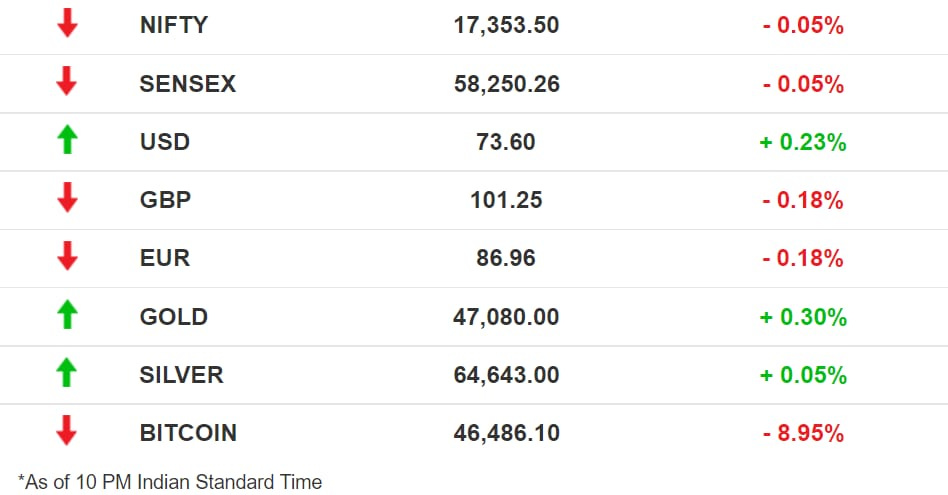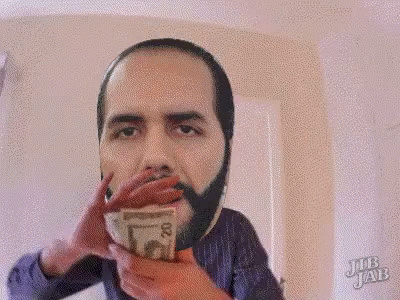Orwellian Australia
Also in today’s edition: The opposite of Satoshi, iCar vs MiCar, OTTs’ flexible approach.
Good morning! Kim Kardashian has broken something again. This time it’s the UK financial regulator’s patience. Of the countless influencers peddling cryptocurrencies as if they were candies on Halloween, a post by Kardashian triggered the FCA chairman into warning people to “be prepared to lose all your money”. Keep up, won’t you?
The Market Signal

Stocks: The benchmark indices staged a late recovery to close marginally lower, while the broader market registered an advance. Among the sectoral indices, Bank and Financial Services were the biggest gainers while IT, Auto, and Media were the biggest drags. Nearly 200 stocks hit fresh 52-week highs on the BSE.
El Salvador And The Making Of The Anti-Satoshi

Day One of El Salvador’s tryst with Bitcoin wasn’t exactly the panacea its 40-year-old populist crypto bro President Nayib Bukele promised. Amidst all the global curiosity around the Bitcoin Beach in El Zonte, and the cryptocurrency’s acceptance in Starbucks and McDonald’s was a botched rollout that prompted selloffs.
Not Satoshi: While the crypto world celebrates Bukele as a cult hero (for now), his actions back home would have Satoshi worried. Recent actions have pointed towards an increased centralisation of power through illiberal means — no-vote legislations (bitcoin law), firing of judges, and overturning a re-election ban.
The lessons: Bitcoin, given its volatility and threat to economic stability, might not be popular after all. Multiple protests which were (and continue to be) held against the no-vote legislation were believed to be one of the factors behind yesterday’s flash crash, besides technical glitches. It may serve as a warning to other countries that wanted to follow suit.
Tldr: A centralised directive overriding a collective of decentralised opinions is ironically against the philosophy of Bitcoin.
Batman Vs Mickey Mouse
HBO and Disney are going head-to-head in the streaming space, with contrasting approaches to different regions.
Playing catch up: HBO Max is soon set to start streaming in India. Its subscription plans are rumoured to be as low as ₹69/month for an ad-supported version. This is on par with Disney-owned Hotstar’s ₹899 annual plan (₹75/month) but a fraction of Netflix’s base price of ₹499/month. At present, Disney+ Hotstar dominates the Indian OTT market while Netflix carries the premium tag with aplomb. It will be interesting to see how the late entrant, seeking to onboard customers with cheap fares, changes that dynamic.
Turning the screws: Meanwhile, in the US, Disney+ and HBO Max are both premium category platforms. Their respective $8/month and $8.99/month base plans are on par with Netflix’s at $8.99/month. Paying customers have made their choices, and the battle now is over who can milk them the most while maximising retention. Netflix raised the cost of its base plan by $1/month last October. Disney+ did the same with its flagship platform six months ago and is now doing it with Hulu, which may suffer as a result.
The X Factor In The EV Race

Doug Field, who was heading Apple’s car project, Titan, has left to join Ford, slamming the brakes on the iPhone maker’s ambition to build the personal transport of the future.
Field would rev up Ford’s EV project to compete with Toyota, General Motors, Porsche, and every other company racing to replace the internal combustion engine that has remained under the hoods of cars for more than a century. Some estimates suggest that by 2040, about two-thirds of cars sold globally will be electric.
The line-up: While it makes sense for traditional automakers to pivot to EVs, what’s interesting is the entry of a bunch of disrupters never known for making cars. And we are not talking about Tesla which until last year made more money selling energy credits than vehicles. We mean startups like China’s Nio, the Amazon-backed Rivian, Google-owner Alphabet’s Waymo, Apple’s Titan and Chinese smartphone maker Xiaomi. Rivian’s pick-up delivery trucks are set to hit the road this year and it is even considering an IPO worth $80 billion. That’s more than the value of General Motors.
The Signal
Elon Musk has already taken potshots at Rivian but that is not the company he should worry about. That would be Xiaomi. In fact, all rivals should be. China is the world’s largest EV market, which gives it advantages of cost and scale, something it demonstrated while quietly becoming the world’s second most popular mobile handset maker. Xiaomi, which makes phones, household appliances and even shoes, has shown that it can design and make impeccable products at an attractive price point. It’s also cash rich, setting down $1.5 billion immediately and an investment of $10 billion over the next decade.
Fighting For A Fortune Denied
At an age when he’d rather put up his feet, Kochi businessman Babu George Valavi is fighting to claim an investment he made over four decades ago in a Udaipur-based company. The investment has now grown to ₹1448.5 crores.
What happened? Babu had bought a 2.8% stake in PI Industries (then Mewar Oil and General Mills Ltd), an unlisted company at the time. Even as its prime distributor in South India, Babu was kept in the dark about the changes in the company in the 1980s.
The twist: In 2015, Babu’s son approached the company, currently listed with a valuation of ₹50,000 crores, to change the original share certificates to dematerialised form. Much to his surprise, the company told him that Babu’s shares had been transferred to others.
Fight to reclaim: Babu has complained to Sebi to reclaim ownership of the shares.
It’s Stifling Down Under

Not trolls, media companies in Australia will be liable for offensive comments on their Facebook posts, according to the country’s apex court. The decision will force media firms to either supervise every comment or just stop posting altogether, another change signalling an Orwellian shift in the country.
Think ‘1984’: Australia is inching closer to becoming a surveillance state amidst a pandemic. The military has been deployed to enforce lockdowns. An application that uses facial recognition and geolocation was mandated in South Australia for home quarantine. This raised privacy concerns around the app. Now, there are talks of taking it national.
Power troubles: Voters are unhappy and their sentiments are critical because Australia will have elections next year. Prime Minister Scott Morrison’s public ratings have hit an 18-month low primarily due to the rigid lockdown. Ironically, the PM took a private jet to meet his father at a time when citizens were forced indoors.
What Else Made The Signal?
Money sprint: Once again, Byju’s has bagged $150 million from three investors and acquired Gradeup, an app that helps with test prep online.
Productive buy: Workplace productivity app maker Notion has acquired Indian startup Automate.io which helps integration with 200 services.
Howdy Paidy: PayPal is increasing its presence in Japan through the acquisition of Paidy, a “buy now, pay later" provider, for $2.7 billion.
Air power: The Tatas have clinched a deal to make aircraft for the Indian army, a first for the Indian private sector. It’ll make 56 transport planes with partner Airbus.
Payback time: Cognizant is paying $95 million as settlement to the US shareholders who filed a lawsuit against the company for bribing officials.
IPO plans: Indian ethnic wear company Fab India is planning a $1 billion share sale.
Chai-time: Tea startup, Vahdam India raised ₹174 crores in a funding round, as the company attempts to expand both online and offline in new locations.
FWIW
![[speed output image] [speed output image]](https://substackcdn.com/image/fetch/w_1456,c_limit,f_auto,q_auto:good,fl_lossy/https%3A%2F%2Fsubstack-post-media.s3.amazonaws.com%2Fpublic%2Fimages%2Fc6e33377-6aad-4da7-92b0-250919a122be_500x281.gif)
Wingardium leviosa: Apple’s iPhone 13 event reveal is happening via a levitating logo that will take you into an alpine lake before revealing details. A clear embrace of the AR the company is moving towards.
I’m NOT a Slave 4U: Britney Spears may soon finally be free. Her father, Jamie Spears, has petitioned a court in Los Angeles to give up his control over her finances and life.
Rock collection: Perseverance, NASA’s Mars rover, is busy picking up mineral pieces on the Red Planet to analyse whether life and water existed there at some point. These will provide the first clues to extraterrestrial life.
In yesterday’s edition, we mistakenly referred to Hindustan Unilever as Hindustan Lever. Our apologies for the error.
Write to us here for feedback on The Signal.



